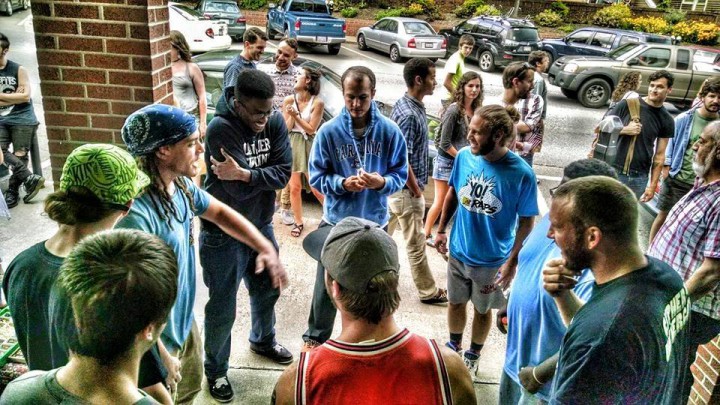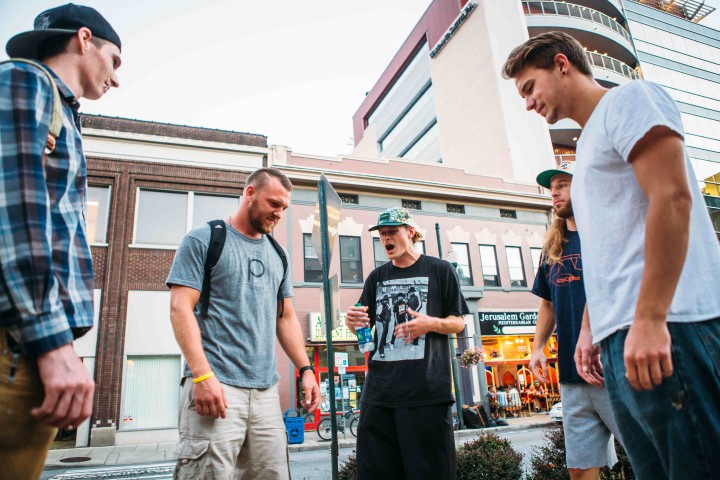“We get born in the Cyph every minute that we breathe it / Cypher with my shadow and my heartbeat, believe it,” writes Boone-based rapper Chris Shreve, aka C. Shreve the Professor, of hip-hop collective Free the Optimus. A cipher, by conventional definition, is a code. In the Urban Dictionary sense, a cypher is a cycle — in freestyling, one rapper follows the next without breaking the circle. And on North Carolina college campuses, it’s come to mean not just a freestyle-in-the-round, but coming together in a spirit of creative expression and mutual respect.
Cypher Univercity (the “c” in univercity represents the urban roots of hip-hop) was started in 2010 at N.C. State University in Raleigh by MC Mike L!ve. The rapper, who now lives in Asheville, assembled his friends in the school’s Free Expression Tunnel to take photos for his album, God Cypher Divine. He was captured on video that night saying that the gathering might turn into a regular weekly engagement — and that’s just what happened. The five-year anniversary of the movement will be celebrated — along with the release of FTOLive, a new album from Shreve’s group and the first with L!ve as a core member — at The Orange Peel on Saturday, Aug. 29.
School’s in
Over a half-decade, Cypher Univercity spread to campuses in Greenville, Greensboro and Boone. A weekly cypher is currently held in Pritchard Park, but L!ve hopes it will move to UNC Asheville’s campus at the start of the fall semester. College students “are the youngest versions of grown adults,” says L!ve. “These kids are into art, they’re into expressing themselves. These are experiences they’ll remember for their rest of their lives.”
For that reason, L!ve and the other MCs involved with the movement have crafted their cypher not as a spotlight-grabbing, ego-boosting contest, as some mainstream cyphers suggest. Instead, L!ve cites the late religious leader Clarence 13X — a contemporary and onetime student of Malcolm X — who founded the youth movement The Five Percenters. While that group’s purpose is a topic of some disagreement, Clarence 13X did share teachings with his followers through sessions he called Ciphers.
The lessons of Cypher Univercity begin with its rules:
1. Respect (the craft, yourself, your fellow humans).
2. Project (speak up, put the word out).
3. Keep the peace.
4. F**k the camera.
5. Be original.
While No. 4 seems the most irreverent, it’s about how “rap and hip-hop, in their core forms, are very spontaneous and organic,” says Shreve. “It doesn’t mean the camera isn’t allowed, but you don’t need to be focused on that. It doesn’t need to be a music video.”
But it can be. Rising North Carolina rapper Rapsody shot the video for her single, “Drama,” at the cypher in Raleigh. And while Shreve, who was there, says it felt awkward to rap to the camera, that video has since been seen around the world. Hip-hop artists such as Asheville’s Hunter Bennett, as well as Tuscon and Jrusalam who will perform at the Orange Peel show, can be spotted on the film.
Universal language

Despite that kind of exposure, L!ve wants the Cypher Univercity events to be free of ego. Instead of high-profile rappers and videographers, “a lot of times it’ll start a cappella,” he says. “No beats. We’ll just go around in a circle.” For those who need a rhythm, the group will add accompaniment by beatboxing.
“While you’re doing it, life is happening all around. It gets interwoven into that moment,” L!ve continues. A passer-by might “kick something on the guitar and we’ll rhyme over it. Nine times out of 10, that person also sings, and next thing you know, we have a singing guitar-player as part of the hip-hop cypher.”
That sense of openness and acceptance relates to rule No. 1, which deals with how cypher participants treat each other and how they act as a community to maintain a spirit of peacefulness. And while Shreve points out that some rappers have brought heavy, politically charged and angry material to the table, the attitude among artists remains respectful. “This is lyrical, not physical,” according to the rules.
That’s why the Aug. 29 event at The Orange Peel is also billed as a stand against racism. The Cypher Univercity organizers see their movement as one that can positively impact race relations. “The whole movement is rooted in a foundation of respect,” says L!ve. “It’s a universal language.” The N.C. State cypher attracts people of all ethnicities and backgrounds, he says, so “tell me why, in five years, there hasn’t been one outbreak of a fight?”
Rap against racism
The openness of the movement not only allows for interaction among groups, but for new rappers to hone their craft alongside seasoned artists. “We’re gonna show ‘em how it’s done,” L!ve says in a Double A Productions video promoting the Orange Peel show. “We the leading revolutionaries are going to lead by example for the future.” But it’s not just rhetoric for the benefit of YouTube viewers — the cyphers create a platform for people of all walks of life to hear and be heard.
“Racial conflicts are really complex and express themselves in a lot of different ways,” says Laura Jeffords, executive director of The Mediation Center. “When people have this venue for communicating ‘What is my story, how did I come to think this and how did I reach these conclusions about what I want and what I think is important?’ that gives people a place to tell their story. [It also gives] other people a place to witness that story without necessarily responding to it in the moment. There’s a lot of room for understanding and finding common ground in that and for recognizing that person’s humanity.”
She adds, “Sometimes with art, because it can be a more complex and nuanced way of communicating, it can be a really neat way for people to hear about other people’s experiences.” Jeffords points to initiatives like the YWCA-led Stand Against Racism as powerful opportunities for people to address topics of race relations and perceptions through community, group and individual activities. Such outlets, she says, are more important now than ever.
Masterclass

“Part of what’s so important about mediation is self-determination,” Jeffords says. “People can and should and need to express themselves in the way that works for them. … We encourage people to tell their story in a way that’s meaningful to them. When people hear those stories, that’s where they find common ground.”
Such opportunities might become more available. The Cypher Univercity movement is growing (the Asheville-based cypher celebrates its first anniversary this month), as is attention on the North Carolina hip-hop scene. FTO recently received the Carolina Music Award for best hip-hop group in the Carolinas. “We are thrilled to have had our hard work recognized,” Shreve says, but he’s also aware that with attention comes competition, shifting values, commercialization and other potentially ugly side effects. Still, he says, “if you get a higher platform, more people can hear your passionate message.”
The forthcoming FTOLive album ties in many of the Cypher Univercity ideas. The name, says Shreve, both highlights L!ve the MC and celebrates the group’s live show. “It was a cool way to look at beats, for me,” he says. “This time, I wasn’t listening for me. I was like, ‘I can hear L!ve destroy this!’” The variety of MCs on the album means there’s a beat and style for every musical taste, and the guest list includes local favorites such as Colston, Bennett and Chachillie.
A video for the song “1234,” set to be released close to the Orange Peel show, plays off the four pillars of hip-hop (the DJ, the MC, breakdancing and graffiti). The scene is a classroom setting. Shreve’s day job is as a teacher at Appalachian State (hence his stage name, “the Professor”), so there’s an inside joke, but the rapper master-class theme is a big nod to the Cypher Univercity movement. If the stage (and the street and the college campus) could be his classroom via hip-hop, “I’d like it be that I taught my class to 50,000 people each summer, and they all got it,” says Shreve.
WHAT: Cypher Univercity: A Stand Against Racism with Free The Optimus, Tuscon, Jrusalam and Pragmaddix
WHERE: The Orange Peel, theorangepeel.net
WHEN: Saturday, Aug. 29, 9 p.m. $15




Before you comment
The comments section is here to provide a platform for civil dialogue on the issues we face together as a local community. Xpress is committed to offering this platform for all voices, but when the tone of the discussion gets nasty or strays off topic, we believe many people choose not to participate. Xpress editors are determined to moderate comments to ensure a constructive interchange is maintained. All comments judged not to be in keeping with the spirit of civil discourse will be removed and repeat violators will be banned. See here for our terms of service. Thank you for being part of this effort to promote respectful discussion.